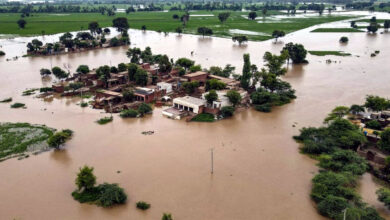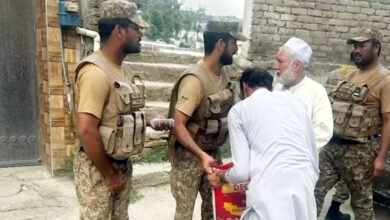سلايدر
US Paradoxical Ties with Pakistan
Written by Sajjad Shaukat
Daniel Markey, a longtime observer of US-Pak relations, wrote in his book, “No Exit from Pakistan: America’s Tortured Relationship with Islamabad”, that “despite all the problems and trust deficit that the US had with Pakistan and its military–the answer lay in managing the problems rather than finding a solution. Why managing problems and why not a permanent solution? It’s because the US civilian leadership thinks differently from Pentagon. The recent example of Pentagon managing the damage caused by Trump’s anti-Pakistan tweets is illustration of the same complexity. US establishment understands that for gaining headway in Afghanistan, support from Pakistan and her Army is a must as Pakistan is the most affected neighbour and partner in War on Terror. Hence it is worthwhile that the US establishment and the political government should start thinking alike to have a long lasting trust-worthy relationship with Pakistan instead of a mixture of love and hate, if they seriously believe that peace without Pakistan in the region would not be possible”.
However, it is due to the US paradoxical ties with Pakistan that confused in their goals, sometimes, US high officials praised Pakistan’s sacrifices regarding war on terror, sometimes, admitted that stability cannot be achieved in Afghanistan without the help of Pakistan, sometimes, presumed that Pakistan’s nuclear weapons are not well-protected, sometimes, realized that US wants to improve its relationship with Pakistan, but at the same time, they blame Islamabad for safe havens of militants in the country. While in connivance with India and Israel, America has been continuing its anti-Pakistan activities by supporting militancy in Pakistan and separatism in Balochistan province.
After the 9/11 tragedy, the US, again, needed Pakistan’s help and President George W. Bush insisted upon Islamabad to join the US global war on terror. Pakistan was also granted the status of non-NATO ally by America due to the early successes, achieved by Pakistan’s Army and country’s Inter-Services Intelligence (ISI) against the Al-Qaeda militants. Within a few years, when the US-led NATO forces felt that they are failing in coping with the stiff resistance of the Taliban in Afghanistan, who are fighting for the liberation of their country, they started accusing Pak Army and ISI of supporting the Afghan Taliban. US top officials and media not only blamed Islamabad for cross-border terrorism in Afghanistan, but accused that safe havens of Al-Qaeda exist in Pakistan. They constantly emphasized upon Pakistan to do more against the militants and continued the CIA-operated drone attacks on Pakistan’s tribal areas by ignoring the internal backlash in the country. In August 2017, President Donald Trump announced the US new strategy regarding Afghanistan as part of the policy in South Asia. Using tough words against the US ally Pakistan, Trump revived the old blame game of regarding the cross-border terrorism in Afghanistan and threatened to target the terrorists’ sanctuaries in Afghanistan and Pakistan.
While Pakistan’s regional rival India’s role is appreciated, Donald Trump added, “We appreciate India’s important contributions to stability in Afghanistan…We want them to help us more with Afghanistan.” Meanwhile, on January 5, 2018, the US suspended $255 million of military aid to Islamabad as a condition to do more against terrorism.
Taking note of Trump’s policy, Pakistan’s civil and military leaders, including all the mainstream political parties united against the US aggressive stance against the country and offered a stark response to Trump’s false accusations.
Pakistan reject being made scapegoats for the policy failures of the US and India. According to Islamabad the new US policy is aimed at de-nuclearising Pakistan…India’s major role in Afghanistan as per Trump administration’s new strategy for the region will have adverse impacts on Pakistan…Trump undermined the country’s major contributions towards that war. It seems Trump has no knowledge of this region.
According to the statement of DG of the Inter-Services Public Relations (ISPR), Maj-Gen. Asif Ghafoor, “Chief of the Army Staff (COAS) General Qamar Javed Bajwa stated that “Pakistan was not looking for any material or financial assistance from USA but trust, understanding and acknowledgement of our contributions…peace in Afghanistan is as important for Pakistan as for any other country.” In another statement, Maj-Gen Ghafoor said: “Pakistan had done enough and it was time for the United States and Afghanistan to do more.” He also urged the US to “check India’s anti-Pakistan role not only from inside of Afghanistan, but also through the enhanced and increased ceasefire violations along the Line of Control and the Working Boundary”.
Mr Pompeo visited Pakistan and conveyed the US desire to work with Pakistan in furthering the shared objectives of peace and stability in Afghanistan. Notably, international community knows very well that Pakistan’s Armed Forces have successfully broken the backbone of the foreign-backed terrorists by the military operations Zarb-e-Azb and Radd-ul-Fasaad. Army and top intelligence agency ISI have broken the network of these terrorist groups by capturing several militants, while thwarting a number of terror attempts. Peace has been restored in various regions of Pakistan, including Karachi and Balochistan province.
Although Pakistan’s security forces have eliminated terrorism, yet, in the recent past and during the election-campaign of 2019, blasts in Balochistan and other regions of the country showed that the US-led India, Afghanistan and Israel have again started acts of sabotage especially to weaken Pakistan and to damage the China-Pakistan Economic Corridor (CPEC) which is part of China’s One Belt, One Road (OBOR) initiative or BRI. Washington and New Delhi has already opposed this project. Foiled terror attack on the Chinese consulate in Karachi on November 23, last year was part of the same scheme. Likewise, bomb blast in Quetta-the capital of Balochistan on April 12, this year killed at least 20 people and injured 48 individuals. On the same day, at least two persons were killed and 13 others wounded in an explosion on Mall Road in Balochistan’ Chaman city. Balochistan is the focus of projects in the $57 billion CPEC, a transport and energy link planned to run from western China to Pakistan’s southern deepwater port of Gwadar which is located in Balochistan. Therefore, well-entrenched in Afghanistan, America CIA, India RAW and Israeli Mossad are assisting the separatist elements of the Balochistan province to thwart the CPEC project.
It is notable that in the aftermath of Pulwama terror attack in the Indian Occupied Kashmir and escalation of tension between Pakistan and India, on February 28, this year, US President Trump said that Pakistan-India tension would de-escalate soon—the United States had been mediating between the two sides and trying to have them stop. Trump also acknowledged that Washington has improved her relations with Islamabad shortly. Especially, American State Department deputy spokesperson Robert Palladino stated on March 5, 2019 that Secretary of State Mike Pompeo played an essential role in de-escalating tensions between India and Pakistan. The fact is that Washington knows that a war between two nuclear countries will also eliminate India.
It is worth-mentioning that the incoming Commander of the United States Central Command (US CENTCOM) General Kenneth F. McKenzie Jr. called on Prime Minister Imran Khan and COAS in this month. The meeting with Gen Bajwa is important from two perspectives. First is important that America’s new military leadership interacts with Pakistan counterparts. Pakistan and US military feel.
The two dignitaries discussed the Pak-US relations and the ongoing Afghan peace talks, among other matters. One day ago, General McKenzie Jr. met with Pakistan’s Chief of Army Staff General Bajwa. The two top commanders discussed the geo-strategic environment and regional security. The discussion also included Afghanistan and the recent standoff between the Pakistani and Indian militaries.
Nonetheless, now, again, American approach towards Pakistan has become very positive, as Islamabad who succeeded in bringing the Taliban to the negotiating Table, is playing a key role in the talks, being held between the US negotiators and the Taliban in the Doha-the capital of Qatar. Despite hurdles, these dialogues are making progress gradually.
Zalmay Khalilzad, the US special envoy to Afghanistan who repeatedly visited Pakistan and met the civil and military leadership, including country’s Foreign Minister Shah Mahmood Quershi, admired Pakistan’s role in the US-Taliban peace talks.





